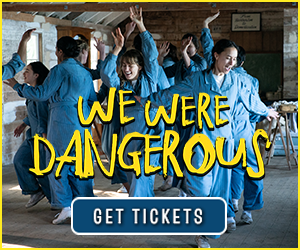THE STORY – Brilliant physicist Ted Hall is recruited to join the Manhattan Project while still a teenager and goes to Los Alamos with no clue what he’ll be working on. When he learns the true nature of the weapon being designed, he fears the post-war risk of a nuclear holocaust and begins to pass significant information to the Soviet Union.
THE CAST – Tom Goodwin & Mickey O’Sullivan
THE TEAM – Steve James (Director/Writer)
THE RUNNING TIME – 101 Minutes
It’s going to be absolutely impossible for any critic or film obsessive to watch “A Compassionate Spy” and not immediately connect it to the recent release of Christopher Nolan’s “Oppenheimer.” Indeed, the documentary from famed filmmaker Steve James (“Hoop Dreams”) inadvertently works in tandem with the blockbuster, as it discusses figures, events, and locations that are also explored in the Nolan film. However, the documentary’s perspective is just a bit different, looking into acts of espionage committed by the late scientist Ted Hall, who worked on the Manhattan Project.
From the start, the film makes clear why Hall exactly did what he did, and the reasoning is certainly unexpected. Hall made the conscious choice to share specific details of the Manhattan Project with the Soviets, which would allow them to build their own nuclear weapons. It’s easy to imagine the reaction Hall’s actions would receive from the general American public during the World War II era and today. But James fixes the film’s perspective squarely on Ted and his wife Joan, explaining that Ted did so in the name of scientific integrity. Ted believed significant scientific discoveries shouldn’t be the possession of one single nation and felt it would be dangerous for America to have a monopoly on nuclear information. To further explain his actions, the documentary uses archival footage and testimony from historians to show that, while suspicion about the Soviets was present during World War II, Americans were encouraged to look to the communists as unlikely allies but allies nonetheless.
James effectively wraps viewers up in this defense of Hall, laying out convincing reasonings through expert and first-hand interviews. Most notably, Ted’s wife Joan (who passed away after filming) is on hand to provide many fiery quotes and thoughts on what her husband did. It’s particularly interesting to see Joan throughout the years, in footage ranging from the 90s to the present day, to witness the evolution of her passion over time. She’s shown in videos from the time that Ted was still alive to be loving and agreeable, and in the interviews shot specifically for the film, it’s clear that she has no hesitation in defending her husband with unbridled vigor. She’s a fascinating subject, bursting with unapologetic defiance.
This is a documentary with a viewpoint leaning heavily on the perspectives and opinions of those who viewed Hall’s treasonous acts as noble. Very little is shown of any sort of counterargument from those who might be concerned about nuclear proliferation, which has the perhaps-unintended effect of making the film seem strangely onboard with the spread of incalculably deadly weapons. The film also curiously underplays Hall’s youth – he was brought onto the Manhattan Project at the age of 18, having already graduated from Harvard. It would be easy to attribute or explain Hall’s actions as a result of his young age, and James seems uninterested in taking on such an argument that could be seen as dismissive of Hall’s convictions.
The film uses a mix of talking head interviews, archival footage, and dramatic recreations to tell Hall’s story. Unfortunately, the latter method is almost always distracting when employed by James. It’s hard to pinpoint what exactly feels off about them. Still, it’s likely a combination of the unconvincing period set dressing and actor styling, along with stilted performances from those cast to play the young versions of Hall and his associates. These moments feel decidedly more History Channel than Hollywood.
But whenever Joan is onscreen, the movie comes alive. And while she makes it clear that their lives were forever affected by Ted’s actions as a teenager, she doesn’t have any regret or blame to place. She’s the driving force behind the film, and she’s sure to stick with audiences as a symbol of steadfast integrity. James never underlines it too heavily, but “A Compassionate Spy” effectively shows the sacrifices that come from standing by your beliefs in a world of contradictions and hypocrisies.






